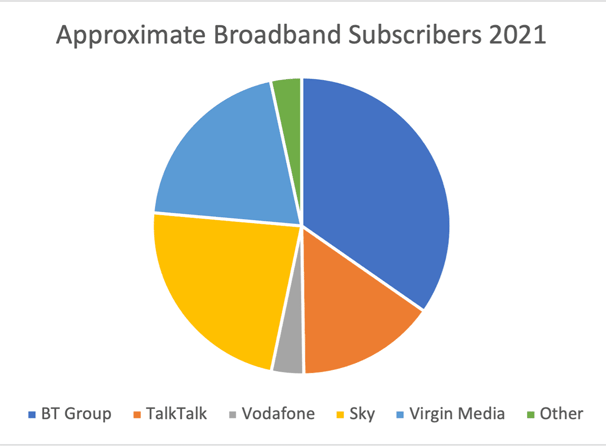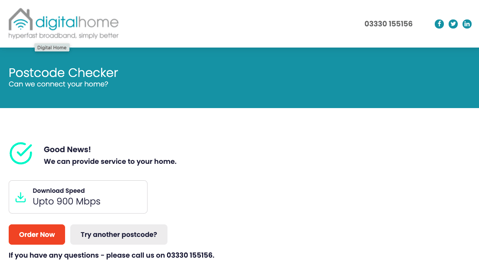Digital Home challenges broadband internet market with POPX
By Company News
Published on November 26, 2021

Bundled over
The UK broadband market has developed at a pace over the last two decades and is a very lucrative business for a small number of dominant Internet Service Providers (ISPs). The market is set to continue to change with the introduction of gigabit full fibre broadband as it is rolled out throughout the UK and we have started to see new market entrants appear but will they be able to make an impact?
Taking on the Big Four ISPs (BT, Virgin Media, Sky and TalkTalk) will not be easy. However, one thing that has stayed relatively consistent since the early 2000s is the poor levels of customer service that the industry has become famous for and the service bundles that are forced upon and anger consumers.
Nefarious dominance
According to industry figures, there are in the region of 65 million UK citizens actively using the internet, about 96% of the population. With the average daily online time for each person now above six hours, it is a market misdemeanour that consumers continue to get a bad deal while a small number of service providers make huge profits. Despite the frequently appalling behaviour of the Big Four ISPs, forcing unwanted service bundles on consumers, the regulator (Ofcom) has been largely ineffective in reining them in.
All this while more aspects of our lives continue to become digitised, compounding our reliance on fast and reliable internet access and ultimately gifting more profits and power to the Big Bad Four. Now that more of us work from home and access internet services for much of our entertainment, we have become drug dependent on pushers, I mean internet providers, who don’t always appear to have the consumers’ best interests at heart.
In 2020, 85% of UK residents purchased a product online, equating to 57.8 million purchases and around 33% have smart devices in their homes. Internet speeds have been increasing to help make our digital lives more efficient, Ofcom claims that superfast (at least 30Mb) broadband coverage has reached 96% of the UK and ultrafast (at least 300Mb) broadband is now available across 59% of the UK. Progress in internet speeds is welcomed, although still lagging behind the very best, but it seems to come at a hefty price!
Why is the UK home broadband market so lucrative to so few?
A significant reason for the attraction to this market for the larger ISPs is the concerning trend that so many of them claim to offer savings by bundling together landline, broadband, pay TV and mobile phone in a single package. They then straightjacket the consumer to long contract terms, tying them to services they often don’t want, need or use, keeping them hostage to the service bundle for years and sometimes even decades.
We saw something similar with the energy companies in the past, but this seems to be taking things to an entirely new level with an unwavering market dominance as demonstrated in the chart below.
 *Broadband connections estimated at 26.8 million by Statista in 2-19
*Broadband connections estimated at 26.8 million by Statista in 2-19
Unbundling the notorious Big Four service bundle
How many people pay a standing charge for a landline telephone they never use or despairingly flick through hundreds of TV channels in the vain hope of finding something interesting? After two decades of being at the mercy of a handful of profit-focused ISPs, we are now beginning to see small green shoots of hope appearing. Hyperfast gigabit broadband could well be the catalyst for change we have all been waiting to see for so long. With new start-up ISPs coming to the market, most will be keen to differentiate themselves from the incumbent suppliers by focusing on the quality of service.
In doing so, they may well begin to chip away at the market dominance of the Big Four, who regularly demonstrate to their paying user base that they don’t deserve their loyalty. Consumers are waking up to the fact they can get better deals for themselves, rather than putting up with the undesirable service bundles that have been forced upon them for far too long and with impunity from the regulator. Once consumers are free to switch providers to take advantage of gigabit broadband via fibre-to-the-home (FTTH) services, we may start to see the service bundle unravel once and for all.
For those lucky enough to have access to gigabit broadband, this may be the perfect opportunity to break free from the grip of the Big Four, allowing them to finally disregard unwanted services by unbundling the undesirables. This will deliver the freedom of choice to put their money into the services they actually want. The big benefit of gigabit broadband is that consumers can directly access any of the subscription services they choose via a fast and reliable fibre connection, giving them full control. Now they can turn individual monthly subscriptions on and off based on their intended usage and affordability, with no fear of ballooning service bundle fees and constrictive long-term contracts.
Introducing the ISP of the future - Digital Home
 One such ISP looking to bring the next generation of hyperfast broadband services to home users, packaged with the best customer experience, is Digital Home. After partnering with POPX they were quickly onboarded to a fully managed and integrated ISP Platform with a fully automated Sale to Bill lifecycle and Field Sales App. They are quickly establishing themselves as a dependable ISP with a Trustpilot rating of 4.6, which is unheard of in the industry. Now, the company is looking to scale the business while remaining true to its service quality principles.
One such ISP looking to bring the next generation of hyperfast broadband services to home users, packaged with the best customer experience, is Digital Home. After partnering with POPX they were quickly onboarded to a fully managed and integrated ISP Platform with a fully automated Sale to Bill lifecycle and Field Sales App. They are quickly establishing themselves as a dependable ISP with a Trustpilot rating of 4.6, which is unheard of in the industry. Now, the company is looking to scale the business while remaining true to its service quality principles.
Andy Hubbard, CEO at Digital Home says, “Our customers demand high performance and reliability, which is why we designed our entire operation to deliver consistently at the highest levels on both counts, packaged with great service. We couldn’t have achieved this so quickly and cost effectively without the POPX ISP Platform.”

To read the full Digital Home case study click the download button below ->
